| Srl | Item |
| 1 |
ID:
115067
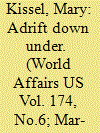

|
|
|
|
|
| Publication |
2012.
|
| Summary/Abstract |
John Winston Howard wasn't just voted out of office after a remarkably steady eleven-and-a-half-year stretch atop Australian politics in November 2007. He lost the prime minister's job to Kevin Rudd, a cheerless career bureaucrat with a skimpy parliamentary record, and lost his local seat to a toothy blond broadcaster with no political experience at all. Yet today the young and the old mob Howard when he wanders out in Sydney, wanting an autograph and a snap with the seventy-two-year-old. They realize that Australia's current leaders have veered the country away from the steady, prosperous path it was on for the past three decades, and in addition to feeling nostalgia for better days they want someone to steer their country back on track.
|
|
|
|
|
|
|
|
|
|
|
|
|
|
|
|
| 2 |
ID:
149187
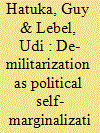

|
|
|
|
|
| Summary/Abstract |
In the elections for the 19th and 20th Knesset, the Labor Party fared badly. The party list for these two election campaigns was almost completely devoid of ‘bithonistim’ – members of the Israeli security elite (MISEs). The article examines the placement of MISEs on the Labor Party list from 1977 up until the 2015 elections. It shows how, from the establishment of the state, the Labor Party was the natural home of MISEs, thereby becoming the dominant party with regard to the Israeli agenda, in which military and security issues occupy a central place. The decrease in the number of MISEs on the Labor list, and their replacement with Member of parliament who are associated more closely with civil issues, have marginalized the Labor Party in relation to the public agenda. The article shows how in Israel, a society organized around cultural militarism, the party’s demilitarization has led to political marginalization.
|
|
|
|
|
|
|
|
|
|
|
|
|
|
|
|
| 3 |
ID:
106335
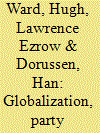

|
|
|
|
|
| Publication |
2011.
|
| Summary/Abstract |
The authors argue that the effects of economic globalization on social democratic parties in Western Europe are conditional on the position of the median voter. If the median is far enough to the right, such parties will adopt business-friendly policies because they are required to win office. Only when the median is relatively far to the left will globalization constrain social democratic parties, forcing them to adopt policies further to the right in order to retain credibility. It is on this basis the authors argue that empirical studies are misspecified unless they include an interaction between measures of globalization and the position of the median. In addition to presenting formal theoretical arguments, the article reports empirical findings from fifteen countries in the period from 1973 to 2002 that support the conclusion that the effects of globalization are indeed contingent on the median. The authors find that the effects of globalization are significant for social democratic parties only in circumstances in which the median is relatively far to the left.
|
|
|
|
|
|
|
|
|
|
|
|
|
|
|
|
| 4 |
ID:
076402


|
|
|
| 5 |
ID:
099482


|
|
|
|
|
| Publication |
2010.
|
| Summary/Abstract |
his study is a political historical account of the significance of the Turkish Labor Party (TLP) (Tuumlrkiye Idotscedilccedili Partisi) in Turkish politics and among the Turkish left in light of the party's parliamentary experience between 1965 and 1969. The TLP's entrance into the National Assembly was an important milestone and a unique phenomenon in modern Turkish politics. The TLP's insistence on the use of parliamentary and constitutional means to come to power was its distinctive feature; and it was this characteristic that distinguished the party from other main organizations and movements of the Turkish left in the 1960s.
|
|
|
|
|
|
|
|
|
|
|
|
|
|
|
|
| 6 |
ID:
169987
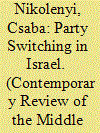

|
|
|
|
|
| Summary/Abstract |
In January 2011, former Israeli Prime Minister Ehud Barak issued a surprising announcement to take four other members of his Labor Party’s Knesset faction with himself to set up a new political party, Haatzmaut (Independence). The conditions under which this split took place illustrate the ways in which the Israeli anti-defection law, passed in the 12th Knesset, incentivizes the behavior of elected legislators who seek to exit from the party that they were elected to represent. This article shows that the anti-defection law cannot keep a legislative party together that suffers from weak internal cohesion. In fact, by imposing numerical criterion (1/3) on prospective party switchers, the anti-defection law prolongs internal disunity, thereby further weakening an already low level of cohesion.
|
|
|
|
|
|
|
|
|
|
|
|
|
|
|
|
| 7 |
ID:
128168
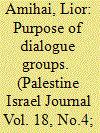

|
|
|
|
|
| Publication |
2012.
|
| Summary/Abstract |
Dialogue groups do not lead to a particular and known political solution but to a more encompassing perception that enables us to cope and fosters a deeper, more accurate and comprehensive view of reality.
|
|
|
|
|
|
|
|
|
|
|
|
|
|
|
|
| 8 |
ID:
131824


|
|
|
|
|
| Publication |
2014.
|
| Summary/Abstract |
Bob Carr's memoirs were greeted with a mixture of derision and anger. The former seemed justified, given the obsession with airline service and protein-rich meals, although it is hard to know whether he was deliberately sending himself up. The latter concentrated almost entirely on his views on Israel, and his claim that the pro-Israeli lobby determines Australian policies towards the Middle East. The subeditors at the Australia were predictably outraged; Michael Danby's (2014) rather incoherent critique was headlined 'Throwing the Jews under the Bus Won't Help Drive the Labor Party into Power', while Nick Cater's (2014) column, which barely referred to the book, was introduced by the phrase: 'Bob Carr's claim of a falafel faction has fired up the Fuhrer-fawning fringe'.
|
|
|
|
|
|
|
|
|
|
|
|
|
|
|
|
| 9 |
ID:
074429


|
|
|
|
|
| Publication |
2006.
|
| Summary/Abstract |
The development of the Labor Party in South Korea will depend on whether politics evolves toward democratic deepening or neo-populism. It appears that the rise of the Labor Party in Korea was a political event that resulted from a prevailing current of democratic deepening. It was also a political event born of collective action on the part of civil society organizations and labor in the course of electoral reform. However, if the political regime does evolve in favor of neo-populism, the political conditions that would enable the Labor Party's sustainable development will be radically eroded. The prospects for the Labor Party in Korea might be regarded skeptically in political as well as economic respects.
|
|
|
|
|
|
|
|
|
|
|
|
|
|
|
|